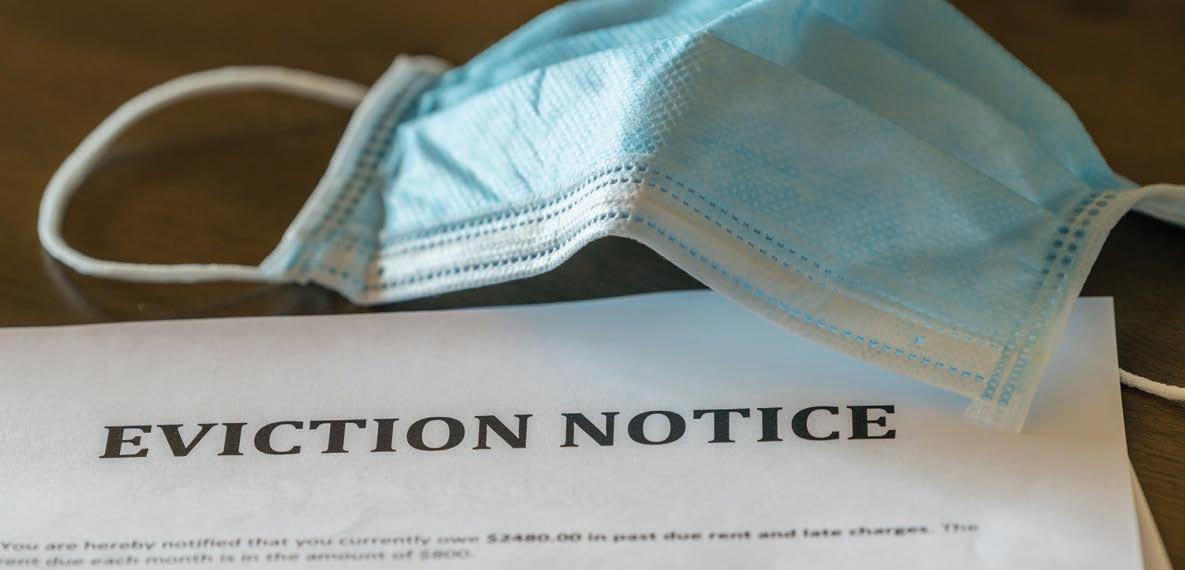
4 minute read
EVICTION JURY TRIALS Is delay inevitable?
PICTURE THIS: A resident has not paid rent since July. You have tried everything – offering payment plans, waiving late fees, suggesting lease cancellations. In August, you gave a 30-day notice to vacate. You filed in September and the court date was set for early October. But then, you received notice that the resident requested a jury trial. The court tells you that you cannot go to trial because the court is not holding jury trials. The case is abated.
You wonder, what is going on? How can this be? Does the resident get to stay in their unit indefinitely without paying rent simply by paying a small jury fee?
COVID-19 has changed the speedy, inexpensive and simple eviction process into one that is lengthy, expensive and complicated.
Since March, we have seen a statewide moratorium on evictions, the CARESAct moratorium on evictions, the CDC order temporarily halting evictions and the modification and suspension of rules requiring timely eviction trials. Since March, we have also seen a prohibition against in-person jury trials.
The Texas Rules of Civil Procedure provide that residents have a right to request a jury trial in an eviction case. Any party may file a written demand for a trial by jury by making a request to the court at least three days before the trial date. Unless otherwise provided by law, the party demanding a jury must pay a fee of $22 or must file a sworn statement of inability to pay the fee at or before the time the party files a written request for a jury.
If a jury is demanded by either party, the jury will be impaneled and sworn in as in other cases. After hearing the evidence, the jury will return its verdict in favor of one of the parties. If no jury is timely demanded by either party the judge will try the case.
The Supreme Court’s Twenty-Ninth Emergency Order issued November 11, 2020, provides that, subject only to constitutional limitations, all courts in Texas may in any case, civil or criminal – and must to avoid risk to court staff, parties, attorneys, jurors and the public – without a participant’s consent, modify or suspend any and all deadlines and procedures, whether prescribed by statute, rule or order, for a stated period ending no later than February 1, 2021. Additionally, in the Supreme Court’s Twenty-Ninth Emergency Order, the court has ordered that a justice court must not hold an in-person jury proceeding, including jury selection or a jury trial, prior to February 1, 2021. In all likelihood, the February 1, 2021 deadline will be extended.
So, is there anything you can do to expedite the eviction trial if a jury has been requested?
There may be. The Rules of Civil Procedure applicable to justice court proceedings provide for the summary disposition of cases with undisputed facts.
1. Motion to be filed with court. According to Rule 503.2 of the Rules of Civil Procedure, a party may file a sworn motion for summary disposition of all or part of a claim or defense without a trial. The motion must set out all supporting facts. All documents on which the motion relies must be attached. The rules state that the motion must be granted if it shows:
• there are no genuinely disputed facts that would prevent a judgment in favor of the party;
• there is no evidence of one or more essential elements of a defensewhich the defendant must prove to defeat the plaintiff’s claims; or
• there is no evidence of one or more essential elements of the plaintiff’s claim.
2. Response to the motion. The party opposing the motion may file a sworn written response to the motion.
3. Hearing by the court. The court must not consider a motion for summary disposition until it has been on file for at least 14 days. The judge may consider evidence offered by the parties at the hearing. By agreement of the parties, the judge may decide the motion and response without a hearing.
4. Order from the judge. The judge may enter judgment as to the entire case or specify the facts that are established and direct such further proceedings in the case as are just.
There are very few defenses to nonpayment of rent. In the case of a nonpayment of rent eviction, oftentimes, it is an undisputed fact that the resident has not paid rent and the facts do not present a valid defense under the lease or the law that justifies nonpayment. For example, even if the resident has had a job loss due to the pandemic, that will not independently be a defense against failing to pay rent under the lease. Of course, with any eviction proceeding, the legal analysis would be subject to any federal, state or local laws that may govern evictions during the pandemic.
Since oftentimes the facts of a nonpayment of rent eviction are not disputed (the resident admits to not paying rent and does not have a legally valid defense), it may be a case that can be entirely decided with a judge granting a motion for summary disposition.
It may be some time before jury trials will be able to be held. Under the right facts and circumstances, you may be entitled to judgment since there are no genuinely undisputed facts. Although granting a motion for summary disposition is ultimately up to the judge, and takes away the resident’s “day in court,” it may be appropriate in certain cases. You might want to consider this the next time you run into a situation where the resident has requested a jury trial when there is no issue regarding the facts of the case.

